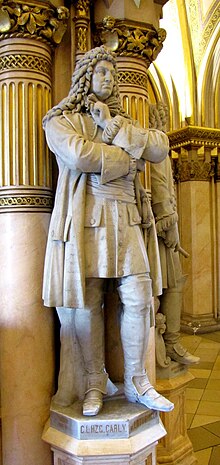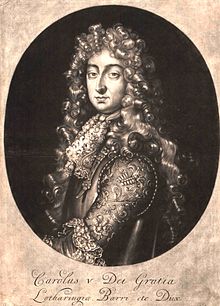Charles V (Lorraine)

Karl V. Leopold , called the Duke without Duchy , (born April 3, 1643 in Vienna , † April 18, 1690 in Wels , Upper Austria ) was titular duke of Lorraine and Bar from 1675 to 1690; he was the son of Duke Nikolaus Franz and Claudia of Lorraine and the brother-in-law of Emperor Leopold I.
biography
Karl, who always and stubbornly called himself Carolus, was destined for a career in the church as a younger son. In 1648 he became provost of Saint-Dié and in 1649 abbot of Gorze . However, the death of his older brother Ferdinand in 1659 made him heir to Lorraine and Bar . He resigned from his church offices and switched to a military career.
From 1663 he was in imperial service, took part in the battle of Mogersdorf against the Ottomans (August 1, 1664). In 1668/69 he applied for the Polish throne without success. In 1671 he fought in Hungary under General Johann von Sporck . During the siege of Murau in Styria , he was in command. The following year he was in command of the imperial cavalry under Raimondo Montecuccoli . He was wounded in the head in the Battle of Seneffe in 1674. In September 1675 he was appointed generalissimo of the imperial armies , and in 1676 he took part in the siege of Philippsburg .
Also in September 1675 he assumed the title of Duke of Lorraine after his uncle Charles IV died in the same month. He was also recognized as a duke by all the states of Europe, with the exception of France, which had occupied Lorraine for a long time. Through his marriage to Eleonore Maria Josepha of Austria in 1678 he became the brother-in-law of Emperor Leopold I. In 1679 he was appointed governor of Tyrol and the foreland . In 1678 he commanded the passage of the imperial army across the Black Forest .
As an imperial general (1675-88), he played a decisive role in the Battle of Kahlenberg on September 12, 1683 and in the capture of Ofen in 1686, as well as in the reconquest of Hungary , Slavonia and Transylvania in 1687 ( Great Turkish War , Battle of Mohács ). In May 1688 he resigned his military office to Elector Max Emanuel of Bavaria . A little later he was reactivated and took over a command in the Palatinate War of Succession . He fell ill during the campaigns. He initially returned to his family in Innsbruck, but then wanted to travel to Vienna to negotiate a comprehensive army reform with Emperor Leopold I.
Although he was not feeling well, he traveled to Vienna, but died on April 18, 1690 in Wels of a pulmonary embolism . According to Voltaire , the French King Louis XIV is said to have said about his death: le plus grand, le plus sage et le plus généreux de mes ennemis est mort - the greatest, wisest and most generous of my opponents has died. Charles V was initially buried in the Innsbruck Jesuit Church. When France released Lorraine in the Peace of Rijswijk in October 1697 , his body was transferred to the Lorraine capital, Nancy , where Charles finally found his final resting place in the Chapel Ducale .
reception
Through the imperial resolution of Franz Joseph I on February 28, 1863, Charles V was added to the list of "most famous warlords and generals worthy of constant emulation in Austria" , in whose honor and memory there was also a life-size statue in the general hall of that time The newly established Imperial and Royal Court Weapons Museum (today: Heeresgeschichtliches Museum Wien ) was built. The statue was created in 1867 from Carrara marble by the sculptor Josef Gröbmer and was dedicated by Archduke Albrecht .
In Vienna- Floridsdorf (21st district), Karl-Lothringer-Straße is named after him.
In Nancy the Boulevard Charles V is named after him.
progeny
In 1678 Karl married Eleonore Maria Josepha (1653–1697), daughter of Emperor Ferdinand III. and Eleonora Gonzaga , and widow of Michael Wiśniowiecki , King of Poland ; her children were:
- Leopold of Lorraine (1679–1729), Duke of Lorraine and Bar
- Charles III Joseph von Lothringen (1680–1715), Bishop of Olmütz , Bishop of Osnabrück and Archbishop of Trier
- Eleanor of Lorraine (1682–1682)
- Karl Ferdinand of Lorraine (1683–1685)
- Joseph of Lorraine (1685–1705), imperial general
- Franz Joseph of Lorraine (1689–1715), Abbot of Stablo and Malmedy
literature
- Constantin von Wurzbach : Habsburg, Karl Leopold . In: Biographisches Lexikon des Kaiserthums Oesterreich . 6th part. Imperial-Royal Court and State Printing Office, Vienna 1860, pp. 390–395 ( digital copy ).
- Karl Friedrich Hermann Albrecht: Karl, Duke of Lorraine . In: Allgemeine Deutsche Biographie (ADB). Volume 15, Duncker & Humblot, Leipzig 1882, pp. 302-308.
- Paul Wentzcke: General of the emperor - life and deeds Duke Charles V of Lorraine . Leipzig 1943.
- Golo Mann , August Nitschke: Propylaea world history . Volume 7. Frankfurt am Main and Berlin 1964.
- Hans Schmidt: Karl V .. In: New German Biography (NDB). Volume 11, Duncker & Humblot, Berlin 1977, ISBN 3-428-00192-3 , pp. 234-237 ( digitized version ).
- Stéphane Gaber: Et Charles V arrêta la marche des Turcs . Presses universitaires de Nancy, 1986, ISBN 2-86480-227-9 .
- Georges Poull: La maison ducale de Lorraine . 1991.
- Hermann Kinder and Werner Hilgemann : dtv Atlas World History . Volume 1, 36th edition. Munich 2003.
- Henry Bogdan: La Lorraine des ducs, sept siècles d'histoire . 2005.
- Hans-Joachim Böttcher : The Turkish Wars in the Mirror of Saxon Biographies , Gabriele Schäfer Verlag, Herne 2019, ISBN 978-3-944487-63-2 .
Web links
| predecessor | Office | successor |
|---|---|---|
| Charles IV |
Duke of Lorraine 1675 - 1690 |
Leopold |
Individual evidence
- ↑ Johann Christoph Allmayer-Beck : The Army History Museum Vienna. The museum and its representative rooms . Kiesel Verlag, Salzburg 1981, ISBN 3-7023-0113-5 , p. 33
| personal data | |
|---|---|
| SURNAME | Charles V |
| ALTERNATIVE NAMES | Karl Leopold |
| BRIEF DESCRIPTION | Duke of Lorraine |
| DATE OF BIRTH | April 3, 1643 |
| PLACE OF BIRTH | Vienna |
| DATE OF DEATH | April 18, 1690 |
| Place of death | Wels , Upper Austria |
